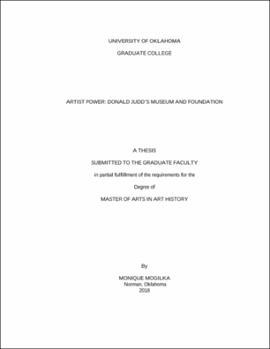| dc.contributor.advisor | Bailey, Robert | |
| dc.contributor.author | Mogilka, Monique | |
| dc.date.accessioned | 2018-05-10T21:25:59Z | |
| dc.date.available | 2018-05-10T21:25:59Z | |
| dc.date.issued | 2018 | |
| dc.identifier.uri | https://hdl.handle.net/11244/299860 | |
| dc.description.abstract | This thesis examines the Chinati and Judd Foundations, established by Minimal artist Donald Judd, to demonstrate how artists can use organizations to wield power and influence in the art world. The Chinati Foundation, a museum, calls for art historical and museological methods to understand its role in the art world, while the Judd Foundation, a nonprofit organization, calls for a multidisciplinary approach where I utilize organizational sociology and participant observation. I argue that the Chinati Foundation uses discursive power in the conceptual break between East Coast and West Coast Minimalism, while the Judd Foundation, a reinstitutionalized museum, exercises power in preserving Judd’s artistic and historical legacy. This thesis builds theories on the form of the artist foundation and how it is becoming institutionalized, a previously understudied phenomenon. Further, it establishes the need for a multidisciplinary approach to understand new organizational forms and demonstrates two types of organizations that artists can create to wield power in an increasingly bureaucratized world. | en_US |
| dc.language | en_US | en_US |
| dc.subject | artist power | en_US |
| dc.subject | artist foundation | en_US |
| dc.subject | Chinati Foundation | en_US |
| dc.subject | Judd Foundation | en_US |
| dc.subject | organizational sociology | en_US |
| dc.subject | Donald Judd | en_US |
| dc.title | Artist Power: Donald Judd's Museum and Foundation | en_US |
| dc.contributor.committeeMember | Rushing III, William Jackson | |
| dc.contributor.committeeMember | Fields, Alison | |
| dc.date.manuscript | 2018 | |
| dc.thesis.degree | Master of Arts in Art History | en_US |
| ou.group | Weitzenhoffer Family College of Fine Arts::School of Art and Art History | en_US |
